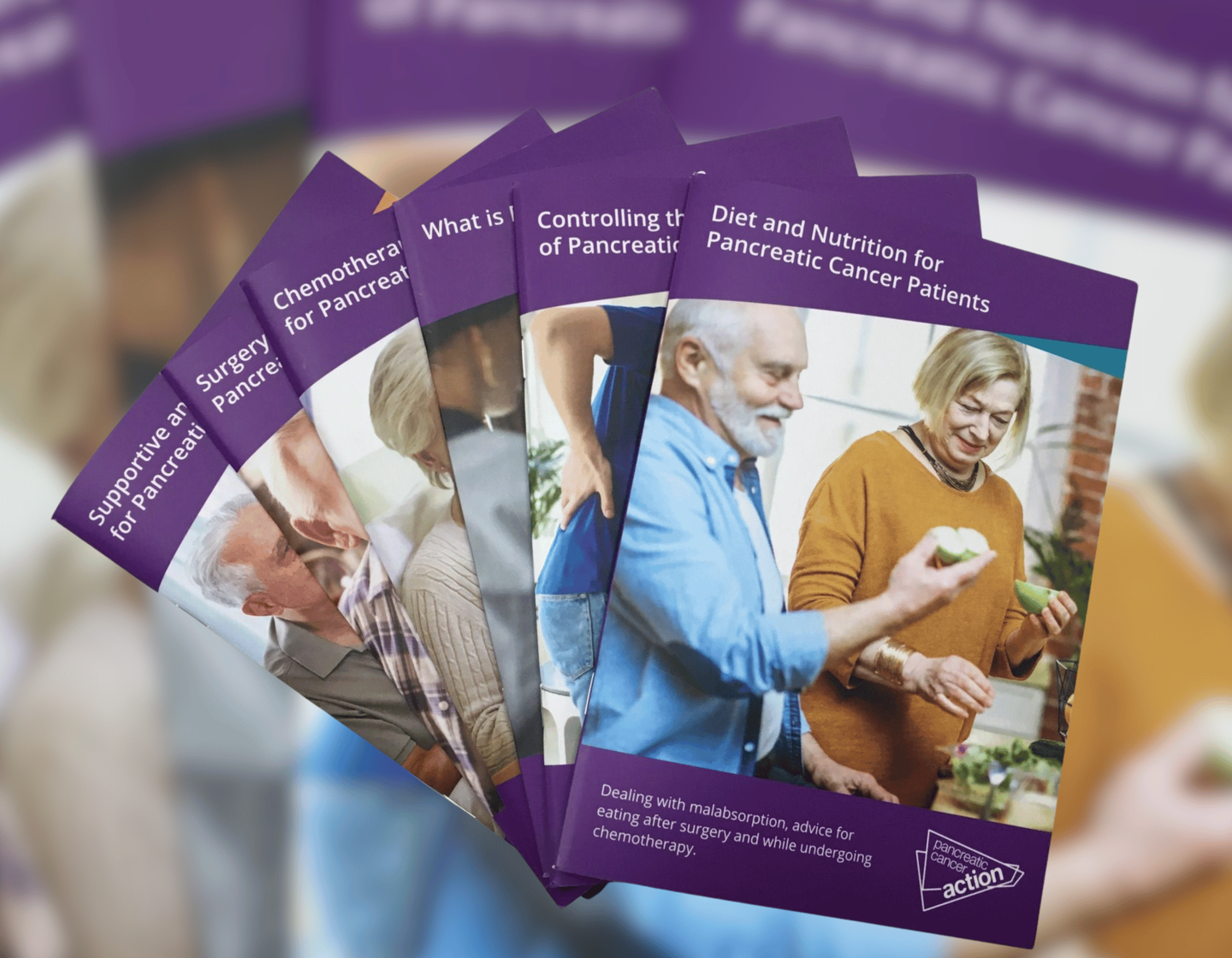Pancreatic cancer patient journey
Diagnosis and treatment pathways
Resources you may find useful, for you and your patient, depending on the stage of the patients journey.
Symptomatic patients
Pancreatic cancer often presents with vague and nonspecific symptoms; therefore, it can be difficult to know when to refer. A-typical symptom presentations are common. Being aware of the symptoms and your high-risk patients’ groups can guide your decision making.
Information for symptomatic patients
-
- - Treatment resistant dyspepsia (indigestion symptoms that are not responding to PPI’s)
- - New onset type 2 diabetes mellitus in patients who are under or normal weight or where there is no other associated metabolic condition or family history of diabetes.
- - Back and/or epigastric pain or discomfort that radiates dorsally and can be relieved by leaning forwards. Patients may complain of pain being approximately where a bra strap would sit.
- - New onset IBS like symptoms in those over 45 years of age. This is a common misdiagnosis of pancreatic cancer. If a patient has never had IBS like symptoms (bloating, flatulence and change of bowel habit) before, it is important to rule out pancreatic cancer.
- Painless obstructive jaundice presenting as yellowing of the skin and whites of the eyes, pruritus or dark urine.
- - Altered bowel movements such as increased frequency, offensive smelling stools, loose bowels and steatorrhea.
- - Unexplained weight loss
- - Nausea and vomiting
- - Loss of appetite and anorexia
-
Pancreatic cancer is often initially misdiagnosed. Common misdiagnosis includes gallstones, irritable bowel syndrome, pancreatitis, peptic ulcer, hepatitis and gastrointestinal reflux disease (GORD).
Studies have found that up to 31% of pancreatic cancer is initially misdiagnosed. Partially due to misdiagnosis, patients often require repeated primary care visits before diagnosis. If you see a patient with persistent symptoms, being treated for any of these conditions, consider pancreatic cancer.
-
If you are concerned about a patient, you may want to provide them with our symptoms diary to allow them to record their symptoms and whether or not any intervention you are trying is working. Your patient may remember their symptoms better if they can write them down and you can use the diary to establish a pattern of symptoms to guide diagnostics. This may also be helpful if your patient visits a number of different GPs in your practice.
Directing patients who are concerned about their symptoms to our website may be helpful so that they can understand whereabouts they are in their diagnosis and what they can expect to happen next.
The main signs and symptoms of pancreatic cancer
Read more about the main signs and symptoms of pancreatic cancer and take a look at our symptoms diary.
Read more
Newly diagnosed patients
Information for you
If you are seeing a patient with newly diagnosed pancreatic cancer, they have a lot of information to take in and potentially unmet information need.
Although your patient will initially be treated under secondary care, ensuring that they understand their diagnosis, treatment options, and side effects is an important part of your role.
As the patient’s GP, you are well-placed to identify their holistic need and long-term challenges. Prognosis and information needs vary by the tumour.
Please see more information depending on whether the patient's cancer is operable or non-operable.
-
If your patients’ tumour is operable, they will likely need a lot of support deciding whether surgery is the right decision for them and understanding what recovery will be like. Organising a cancer review with the patient can identify your patients’ needs, and you can help them access support or provide information to supplement their knowledge.
Information for your patient
Community sign-posting
If a patient with operable pancreatic cancer has not been referred, they will benefit from a dietitian referral. Pancreatic cancer management includes psychological support, and this should be considered during appointments. Patients may also benefit from social services referral if they are struggling to carry out activities of daily living with their condition or lack a support network at home.
Symptom management for your patient
Pancreatic Cancer Action produces a booklet, “Surgery for Operable Pancreatic Cancer” that patients can take away and examine in their own time, to complement the information that they have been given.
If your patient is having chemotherapy, they will benefit from our booklet “Chemotherapy Treatment for Pancreatic Cancer”.
-
If your patients’ tumour is inoperable, they will have a different need in terms of support. Organising a cancer review with the patient can identify your patients’ needs and you can help them access support or provide information to supplement their knowledge.
Information for your patient
Community sign posting
Patients who are not referred to dieticians will still benefit from this intervention to maintain their quality of life. Early referral to palliative care is proven to prevent over treatment and improve quality of life in patients with pancreatic cancer.
Advanced care planning
It may also benefit your patient to begin to discuss advance care planning and resuscitation with them. Patients or carers may need assistance from outside organisations, such as social services, to assist them as their condition deteriorates.
Symptom management for your patient
Pancreatic Cancer Action produces health information for “Controlling the Symptoms of Pancreatic Cancer ”. This booklet will discuss pancreatic cancer symptoms as the disease progresses and guides patients through pharmacological and surgical management.
If your patient is having chemotherapy, they will benefit from our health information booklet “Chemotherapy Treatment for Pancreatic Cancer”.
Macmillan Cancer Support produce booklets and online information for carers and patients whose disease is advanced. Information ranges from coping with the diagnosis to care planning and help that’s available for carers. The website hosts forums where patients and carers can talk to people in a similar position to their own and seek advice.
Disease progression
Pancreatic Cancer Action also offer a booklet on “Supportive and End of Life Care for Pancreatic Cancer”. This is designed to help patients and their families understand the end-of-life process and begin to make plans accordingly. This may also help you to approach the topic with patients and their families and the information may be useful to them during a difficult time.
Resources for your patient
Now may be a good time to refer your patient to materials on our website about coming to terms with their diagnosis and clinical trials.
If your patient is not sure what pancreatic cancer is and what has led them to this point, our patient information booklet “What is pancreatic cancer?” may help them with their understanding.
It can be viewed online or delivered free of charge to the UK.
Nutrition for patients
Information
Whatever the stage of pancreatic cancer your patient is at, they will face issues with nutrition. Maintaining a healthy body weight is difficult for patients suffering from malabsorption, vomiting or loss of appetite.
Your patient should be referred to a dietitian to assist in managing their condition.
Pancreatic cancer is strongly associated with cachexia and management of this requires a multidisciplinary approach including nutritional, dietary, physical, psychological and pharmacological support and regular review.
-
Patients with pancreatic cancer will often need to take pancreatic enzymes (PERT) to manage their condition, these are normally in the form of high doses of Creon®, Nutrizym® or Pancrease® (though other medications are available). This will most often be prescribed in secondary care, but you may need to make adjustments to the dose as the patient discovers what is right for them.
*Jewish or Muslim patients may need to be counselled that Creon is acceptable to their religion and the chief rabbi and the London Central Mosque Trust have approved PERT for use in patients where no alternative is available.
Patients technique with PERT will need to be monitored as patients adjust and learn about their medication, how doses vary depending on the meal and medication storage instructions. Though many patients are the experts in their own needs and medications, many miss this guidance.
You can refer patients to our online PERT page, which answers to common questions on nutrition supplements.
-
Pancreatic Cancer Action produces information for patients specific to diet and nutrition.
A booklet for “diet and nutrition” and a separate recipe book to assist patients in eating well with pancreatic cancer can help patients to understand what they should be eating and how to fortify or add extra nourishment to meals.
Both booklets can be viewed online or ordered free of charge to the UK.
PERT pancreatic enzyme replacement therapy
Learn more about Pancreatic enzyme replacement therapy, which involves taking the digestive enzymes you need in the form of a tablet.
Read more
Patient information booklets
Our patient information booklets surrounding pancreatic cancer are easy to understand and ideal to have at hand to answer questions you may have.
Read more
Palliative patients
Information for you
Unfortunately, many patients diagnosed with pancreatic cancer will have advanced, late-stage disease. For most patients, a pancreatic cancer diagnosis means good supportive care and palliation.
Identifying these patients as they are heading towards the end of their life can help you to ensure that you understand your patient and their loved one’s priorities and can establish a care plan as soon as possible.
It is important to prioritise supporting your patients to make advance planning decisions and manage their symptoms.
Resources for your patient
Macmillan Cancer Support produce a range of publications to support patients with advanced cancer as well as their carers. These range from coping with the news and practical considerations through to what to expect at the end of life. Booklets also come in easy-to-read formats, and patients can engage with specialist nurses and other people in a similar situation on their forums.
Supportive and end of life care for pancreatic cancer
This booklet for patients and carers describes palliative care and life with advanced pancreatic cancer
Read more
Clinical trials
If you are looking for information on open pancreatic cancer clinical trials, please click on the following links.
Cancer Research UK clinical trials
Search for clinical trials through the cancer help database from Cancer Research UK.
Read moreNIHR Be Part of Research
Search for research using the Be Part of Research NHS research website.
Read moreEORTC database
Search for open clinical trials using the EORTC (European Organisation for Research and Treatment of Cancer) clinical trials database.
Read more